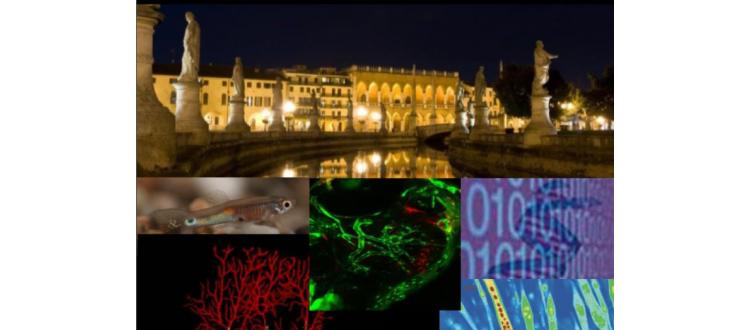PhD Program in Biosciences
Organization and facilities
The scientific issues of the PhD course in BIOSCIENCES reflect the most important topics of modern biology, from basic to applied research and relate to all levels of biological organization, from molecules to organisms and from cells to ecosystems. The disciplinary range offered reflects the research trends at the Department of Biology, the administrative and scientific home of this PhD course, whose full scientific representations are the four different curricula offered.
Our PhD students have access to first-class facilities (see below) at the Biology Department and work within a friendly and strong international research community under the supervision of experts of the field. Research opportunities are multi-disciplinary, spanning the whole range of biological research. Interdisciplinary approaches are encouraged as well as the interaction among PhD students (approx. 40 PhD students are enrolled at the Biology department), post-docs and the over 70 faculty members of the Department.
Certain lines of research will be carried out at research centres associated with the Department of Biology, such as the Centre for Innovative Biotechnologies (CRIBI), the Botanical Garden of the University of Padua, the Venetian Institute of Molecular Medicine in Padua, the Marine Station of the Department of Biology, Chioggia, Italy.
Facilities at the Department of Biology include: Electron and confocal microscopy; Electron Magnetic Resonance Spectroscopy; Ultracentrifuges; Cell culture facilities; the Unipd Zebrafish Facility (Zebrafish line maintenance and acquisition, transient lines from DNA injection, mutant, stable transgenes, whole mount in situ hybridization, morpholino, Crispr/cas and Talen technology, microinjection, germ line transformation, mRNA injection); aquaria facilities for breeding tropical fish and Xenopus; plant growth facilities (including a T/Light-controlled greenhouse); barrier and conventional mouse facility (with more than 2000 cages); flow cytometry facility (FacsCanto and FacsCalibur); P2 viral and bacterial vector facility; Next Generation High Throughput DNA Sequencing, Gene Expression Analysis, Peptide Facility; Cluster of High Performance Computers for scientific calculus and bioinformatic analysis of Next Generation Sequencing and protein analyses and dedicated software (http://genomics.cribi.unipd.it/main/category/bioinformatics/). A library with more than 40,000 volumes is permanently (24h) accessible to PhD students and provide online access to scientific bibliographic databases (WoS, Scopus) and thousands of scientific journals.
Duration, admission, scholarships
The PhD programme in Biosciences has an expected length of 3 years. About 10-12 students enter the programme every year. The School aims at selecting the best candidates applying from all over the country as well as from abroad. Admission is by competition which is open to people of all ages and citizienship who already have a Diploma di Laurea (vecchio ordinamento) or Laurea Specialistica/Magistrale (nuovo ordinamento), issued in Italy, or an academic qualification of equivalent level issued by a foreign University and recognized by the academic authorities, or by inter-university agreement of cooperation and mobility.
Competitions are held annually, with the call being published around June of each year. Courses start the following November. For full information, see the Admission section on the page ofUniversity of Padua call announcement. Most available positions are supported by scholarships from the University of Padua or from other institutions (awarded on the basis of qualifications only). The annual scholarship amounts to around 13,600 €. For periods of study abroad (up to 18 months) the scholarship value is increased by 50%. Moreover, the School contributes to travel and living expenses abroad, according to budget availability. Special additional grants for non-Italian students (awarded on the basis of qualifications only) are awarded by the CARIPARO Foundation. These grants include all University and Department fees, full board at the University accommodation and provide an additional personal scholarship of 13,600 € for year for a total of 3 years. Students have access to the funds of the PhD Course and to internal research grants to cover travel and other research expenses (e.g. conferences, consumables, microscopy and DNA sequencing services). Each PhD student’s research and didactic activity will be supervised by a tutor assigned by the School Collegiate. See the Admission section and the page of University of Padua call announcement for updates. Please, follow carefully the instructions for application in the announcement.
Study programme
The School is characterized by both common teaching activities and courses specific for each curriculum. Each curriculum organizes 1-2 courses every year, but each student has the possibility to attend courses belonging to other curricula. In this way, each student will have the possibility of choosing among 6-12 courses every year.
Journal Club activities are organized by the curricula and all the students have to critically present in English a recent paper, once a year. In addition, several seminars on specific subjects are organized that take place at the Vallisneri building. Scientific seminars organized by Departments external to the Vallisneri implement the already wide panel of the internal ones. At the end of each year, every student presents in English a brief summary of his/her research activity to the tutor, the PhD school board and to an external reviewer for approval.
Original research results should be presented in the PhD thesis at the end of the third year and, after receiving a positive evaluation by the School Collegiate, discussed in front of a Committee composed by Italian and foreign experts on the thesis topic. The thesis has to be written in English.
Our PhD students have access to first-class facilities (see also below) at the Biology Department (http://www.biologia.unipd.it) and work within a friendly and vibrant international research community under the supervision of experts of the field. Research opportunities are multi-disciplinary, spanning the whole range of biological research, from the protein, cellular and molecular level to organisms and populations. Interdisciplinary approaches are encouraged as well as the interaction among PhD students (approx. PhD 60 students are enrolled at the Biology department), post-docs and the approx. 70 faculty members of the Department. Students have access to the funds of the PhD Course and to internal research grants to cover travel and other research expenses (e.g. conferences, consumables, microscopy and DNA sequencing services).
Certain lines of research will be carried out at the research centres associated with the Department of Biology, such as the Centre for Innovative Biotechnologies (CRIBI, http://www.cribi.unipd.it), the Botanical Garden of the University of Padua (http://www.ortobotanico.unipd.it/en/), the Venetian Institute of Molecular Medicine in Padua (http://www.vimm.it/) the Marine Station of the Department of Biology, Chioggia, Italy (https://chioggia.biologia.unipd.it/en/).
Facilities at the Department of Biology include: Electron and confocal microscopy; Electron Magnetic Resonance Spectroscopy; Ultracentrifuges; Cell culture facilities; the Unipd Zebrafish Facility (Zebrafish line maintenance and acquisition, transient lines from DNA injection, mutant, stable transgenes, whole mount in situ hybridization, morpholino technology, microinjection, germ line transformation, mRNA injection); aquaria facilities for breeding tropical fish and Xenopus; plant growth facilities (including a T/Light-controlled greenhouse); barrier and conventional mouse facility (with more than 2000 cages); flow cytometry facility (FacsCanto and FacsCalibur); P2 viral and bacterial vector facility; Next Generation High Throughput DNA Sequencing, Gene Expression Analysis, Peptide Facility; Cluster of High Performance Computers for scientific calculus and bioinformatic analysis of Next Generation Sequencing and protein analyses and dedicated software (http://genomics.cribi.unipd.it/main/category/bioinformatics/). A library with more than 40,000 volumes is permanently (24h) accessible to PhD students and provide online access to scientific bibliographic databases (WoS, Scopus) and thousands of scientific journals.
Curricula:
Biochemistry and Biotechnology,
Cell Biology and Physiology,
Evolution, Ecology and Conservation
Info: https://dottorato.biologia.unipd.it/







